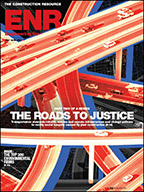Toll roads—just those two words bring out extreme reactions. Either you hate them or you think they're the panacea for all that ails transportation. The conflict dates from the birth of the nation, and since then, the proper roles of government and private enterprise have been debated ad nauseam. Through prudent historical compromises,
we have created a transportation system that is the envy of the world. In the new political world where compromise is a dirty word, I'm reminded of George Santayana's admonition that those who cannot remember the past are condemned to repeat it.
This conflict between governmental and private roles can be traced to what Alexis de Tocqueville saw as the fundamental flaw of American ideology: the inherent conflict between government driving equality and private enterprise driving liberty. De Tocqueville believed in the advantage of liberty over time but felt that demands for equality would be used as a weapon against liberty.
In the early years of the nation, there were three toll-road eras: from 1792 to 1845, when there were 1,562 toll-road incorporations in the eastern states; from 1847 to 1853, when plank roadbuilding boomed; and from 1850 to 1902, when toll roads were developed in the far West. The cumulative investment in toll roads from 1800 to 1830 was $25.5 million, which in 1830 was 6.15% of the nation's gross domestic product. When compared with the national interstate highway system, the expenditure from 1956 to 1996 was $330 billion—just 4% of the 1996 GDP.
The great toll-road eras were of particular interest to de Tocqueville. He saw that the shareholders of these toll enterprises were both ordinary local residents and the more affluent pillars of society; both were interested in developing their land for the long run. "I maintain that there is only one effective remedy against the evils which equality may cause, and that is political liberty," he wrote.
All three toll-road eras could not sustain themselves despite the enormous investment. Unequal road quality—rich counties had good roads, but poorer ones transformed into mud—and a lack of vision made toll roads unpalatable to the public. Liberty at the cost of equality was not accepted.
The Interstate Boom
The interstate highway system is often cited as one of the greatest government public-works programs. It created unprecedented economic opportunity for all. This federally planned and funded system would have shocked the nation's founders, who believed in a restricted federal role.
The design of this system nearly proved the compatibility of equality and liberty. While the grand vision and funding came from the federal government, construction and the profits from it were realized by private entrepreneurs, creating innumerable local millionaire contractors around the country.
If this was such a great model, why do we find ourselves in a transportation-funding crisis? The conflict is once again about the balance between equality and liberty. To tax in the name of infrastructure and then use those funds for other purposes is seen as a breach of trust at all levels of government. The politicization of decision-making has created a vacuum on the national stage.
 |
| TRIPATHI |
Present-day voters understand this danger very well and will do what is needed to control what lawmakers do with tax money. This wariness about how legislatures spend our taxes explains why Americans vote to approve local and statewide bond programs that clearly outline the public deliverables but vehemently oppose increases in the gas tax.
The distaste for toll roads remains high. What has changed is the degree to which Americans distrust how politicians spend their tax monies.
Toll-road enthusiasts should remember the past to be sure their present-day advocacy isn't based on irrational exuberance. Let toll roads be part of the solution, not a way of life.
Rakesh Tripathi, P.E., has served in management and executive positions for both the Texas and Arizona state departments of transportation.


Post a comment to this article
Report Abusive Comment